For most people, a clean and healthy work environment can make a huge difference not only in productivity levels but also with mental and physical health along with the overall enjoyment and satisfaction one gets out of work. And with more people than ever working from home full time, optimizing one’s home office setup is a must.
When you think of toxic things in your environment, your desk is probably not the first thing that comes to mind. But in fact, desks can include toxic finishes, glues, paints, and other chemicals that can off-gas into your home and increase indoor air pollution.
So in this article, we’re going to talk about what to look for in a non-toxic desk, and then give you our recommendations for the best brands to check out.
Oh, and check out this guide for some more pointers on how to create a non-toxic and eco-friendly office.
Table of Contents
- Materials
- Little to No Adhesives
- Zero- Or Low-VOC Paints and Finishes
- Third-Party Certifications
- Dimensions
- Ergonomics
- Organization & Systems
- Lifestyle
- Budget
- Choose Your Battles & Pick Your Priorities
- The Best Brands for Non-Toxic Office Desks
- Skagerak Georg Desk from MINNA (Our Overall Favorite Non-Toxic & Natural Wood Desk)
- Copeland (Best for a Motorized Sit-Stand Desk)
- ducduc (Best for Kids’ Desks)
- West Elm (Best Bang for Your Buck)
- Masaya & Co.
- Pottery Barn (Best for Desk/Bookshelf Combos)
- Medley (Best for a Minimalist Computer Desk)
- wwmake (Best Eco-Friendly Reclaimed Wood Desks)
- NotADesk (Best Floating Mobile Desk)
- A Few More *Pretty Good* Options for Non-Toxic Desks
- Work From Home Desks (Best Modular/Collapsible Desk)
- Steve’s Rack Shack
- Bonus: Fluidstance Balance Board for Your Standing Desk
- Conclusion
This post may contain affiliate links, which means we may earn a small commission if you choose to make a purchase. We only make recommendations that are genuine and meet our material standards.
Featured Image Credit: Medley
What Exactly Makes a Desk Toxic?
The materials that make a desk potentially toxic primarily include things like glues, solvents, and finishes.
Take wooden desks, for example. Just like with bed frames and dressers, many wood desks are not actually made out of solid wood, but rather engineered wood.
To make engineered wood, manufacturers take pieces of wood (wood chips, sawdust, etc.) and glue them together to make what appears to be real wood. But as you might imagine, gluing all of those tiny pieces together requires a LOT of adhesive! Those glues often contain harsh chemicals such as formaldehyde, which is linked to things like skin irritation and cancer.
Since formaldehyde is a volatile organic compound (VOC), it can evaporate from your desk and into your air, where you then breathe it in. (This is one reason why opening the windows regularly and/or getting an air purifier can also make a big difference!)
Words like “MDF,” “particleboard,” or “plywood” indicate that the wood is engineered and not solid wood, so be on the lookout for those words on product description.
The other thing that often makes desks (and other wooden furniture) unhealthy is the finish and/or lacquer that is applied to the wood. Just like with glues, of these finishes contain harsh chemicals that really aren’t necessary when healthier and safer alternatives exist.
What to Look for in a Non-Toxic Desk
Materials
When shopping for a non-toxic desk, look for safer materials like:
- Solid wood (as opposed to engineered wood, plywood, MDF, particleboard, etc.) The majority of the recommendations on this list are natural solid wood, although we have included some brands that use some engineered wood as well. Those ones are indicated accordingly and most of them use low-VOC glues and adhesives.
- Glass desks obviously come with their own shortcomings—mainly that they are more breakable and difficult to move. But it’s the most “pure” option in terms of materials. Those who are extremely sensitive to chemicals might choose a glass option.) Here is an all-glass desk from Walmart, and here is a good option from West Elm (it does have wooden legs).
- Bamboo is another great eco-friendly option to look for. It’s lightweight, durable, and requires less resources to grow compared to wood.
- Metal (especially unfinished metal)
Little to No Adhesives
Like we discussed above, much of the toxins that exist in furniture come from the glues and adhesives involved—whether it’s to glue particleboard together, to keep trims attached, or to hold the desk as a whole together. Look for brands that are using no adhesives at all and/or minimal or low-VOC adhesives.
Zero- Or Low-VOC Paints and Finishes
Finishes are important to the durability of your desk, along with things like mold prevention. However, there are plenty of safer options for finishes, including things like natural linseed oil and water-based synthetic finishes that contain significantly less volatile organic compounds compared to their conventional counterparts.
Third-Party Certifications
Another thing to look for are third-party certifications such as GREENGUARD (or GREENGUARD Gold), Formaldehyde Free Verified by UL Environment, Sustainable Forestry Council (FSC), and Sustainable Furnishings Council. Each of these certifications has its pros and cons, and most of them aren’t perfect. But they can still be a good indication that a certain product has at least passed some sort of validation in terms of the safety of the materials used.
What Else to Consider When Buying a Desk
Aside from materials, here are some other things to consider when shopping for a desk:
Dimensions
What kind of space will your desk occupy? Do you need something more compact, or can you fit a larger desk—maybe an L-shaped one, perhaps? Will you be the only one using the desk, or will you be sharing it with someone else?
Ergonomics
Do you want a traditional sitting desk, a standing desk, or one that you can switch back and forth? Do you want a stand for your monitor to sit higher than your keyboard? What height desk would be best for you? Will it work well with your favorite office chair? These are all great questions to consider—especially when you’ll likely be spending quite a bit of time at your desk!
Organization & Systems
Do you like a minimalistic setup with just a tabletop and a computer, or do you need lots of drawers, filing cabinets, shelves, and compartments?
Lifestyle
Do you move around a lot? If so, you might want to consider getting a lighter weight desk. If not, you might choose a heavier, more “permanent” desk.
Budget
Of course, budget is usually a good thing to consider as well! You’ll find that the desks on this list vary quite widely in terms of price point.
Choose Your Battles & Pick Your Priorities
Sometimes, it’s hard to find a product that fits ALL of your needs in terms of non-toxic materials, lifestyle, budget, and everything else. This can certainly be true when it comes to desks. For example, it’s difficult to find an electronic sit/stand desk that is made out of 100% non-toxic materials (although Copeland is a really great option!). If being able to easily switch between sitting and standing throughout your day is important to you, you may choose an adjustable desk that’s made from almost all non-toxic materials, even if it has a few shortcomings.
What I’m essentially encouraging you to do is to weigh out all of your options and priorities and then choose the best option for you based on what’s currently available on the market.
This is one the biggest reasons why we like to give a list of options for the best non-toxic and natural products as opposed to just recommending ONE “best” brand… Everyone has different needs and preferences!
P.S. On a related note, it’s practically impossible to find a completely non-toxic anti-fatigue mat since they’re all made out of synthetic foam. But since using an anti-fatigue mat can make quite a big difference on your feet and back, it might be worth it to buy a better (if not perfect) option. For example, this is the brand I use. House of Noa’s mats are made from EVA foam and are tested against both the U.S. and E.U. standards for safety in terms of things like heavy metals, lead, formaldehyde, phthalates, etc. They are also California Prop 65 compliant and are printed with non-toxic dyes and inks.
What About Non-Toxic Office Chairs?
We’ve actually got an entire article on non-toxic desk chairs for you—just click here!
Home
How to Create a Non-Toxic & Sustainable Home Office
Our work environment can make a big difference in how we feel. For that reason, we’ve put together a guide to creating a non-toxic and sustainable office.
The Best Brands for Non-Toxic Office Desks
Now, without further ado, here are our recommendations for non-toxic (and almost non-toxic) desks. On this list, you’ll find mostly natural wood desks, but also desks made from bamboo, glass, and metal as well. You’ll find a variety of different types of desks (sitting, standing, L-shaped, etc.) along with a range of sizes and price points.
We’ve also prioritized brands that are not only using safer materials but are also committed to sustainable sourcing and fair trade manufacturing processes as well.
Skagerak Georg Desk from MINNA (Our Overall Favorite Non-Toxic & Natural Wood Desk)

Price: $1,269-$1,508
Materials: Solid FSC-certified raw oak
Type: Standard writing/computer desk
Eco Features: Untreated, Handmade to order
This gorgeous, minimalistic desk is not only made out of FSC-certified hardwood, but it comes untreated, which means it contains zero VOCs. (You can treat it with a natural and non-toxic finish such as linseed oil if you wish!)Each desk is handmade to order by skilled artisans who are paid a living wage for their work. You can order it with or without the side drawer.
Copeland (Best for a Motorized Sit-Stand Desk)
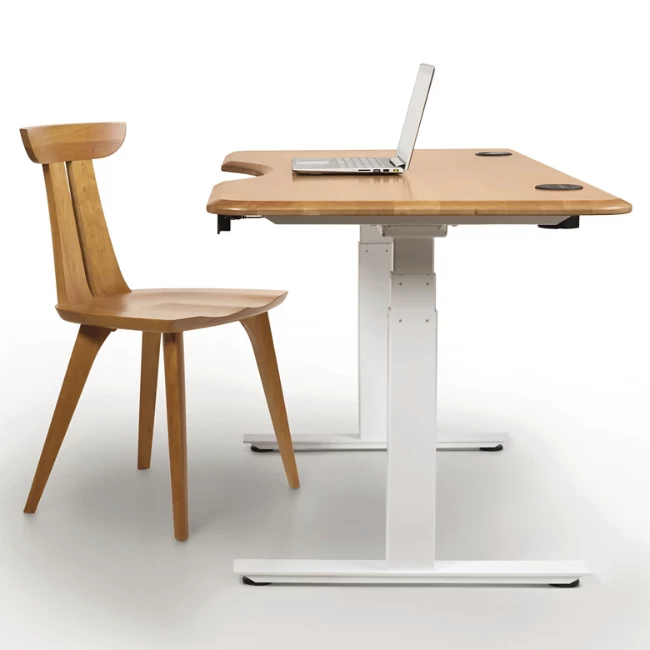

Price: $1,000-$4,000
Materials: Solid hardwood, Metal
Type: Sit-stand desks, desks with modesty panels, standard writing/computer desks
Eco Features: GREENGUARD Certified, Made in USA, Member of Sustainable Furnishings Council, Some desks use FSC-Certified wood
Our Pick: Invigo Sit-Stand Desk
Copeland carries a variety of different types of desks, from motorized sit-stand ones to large, wooden L-shaped desks, to a desktop organizer, and more. Their desks are pretty customizable, too—you can choose from various colors of wood, leg finish, size, etc. You also have the option of adding a modesty panel or an ergonomic cutout with a beveled edge.
All Copeland Furniture pieces are designed and made at their manufacturing facility in Bradford, Vermont.
ducduc (Best for Kids’ Desks)


Price: $695-$1,050
Materials: Solid baltic birch wood
Type: Writing desks, double-wide desks, art desks
Eco Features: Solid wood, non-toxic glues & finishes, handmade in the US
Our Pick: Indie Art Desk & Seat
ducduc is a furniture brand that’s technically targeted toward children’s rooms, but their desks are great for anyone! They have several different designs: their Indi Art Desk, which comes with a bench seat and built-in pencil and art supply holders; their standard writing desk with three drawers on the side; and various different kinds of double-wide desks with extra storage.
Everything from ducduc is made in the USA out of solid (MDF-free) wood, non-toxic glues, and water-based finishes. Available colors include natural wood, white, grey, and “midnight” blue.
We featured ducduc in our guides for non-toxic bed frames, dressers, and nightstands, too!
West Elm (Best Bang for Your Buck)


Price: $300-$5,000
Materials: Wood (they carry both solid and engineered, so be sure to check), Glass, Metal, Concrete
Type: Computer & writing desks, L-shaped, Minimalistic, Desks with drawers, Wall desks
Eco Features: GREENGUARD Certified, Fair Trade, Sustainably Sourced, Handcrafted
One of the great things about West Elm is that they have a wide range of options—different sizes, shapes, price points, aesthetics, etc. Not all of them are 100% non-toxic, but they do give you the ability to filter by what’s most important to you, so you can buy a GREENGUARD Certified desk, a Fair Trade certified desk, etc. West Elm uses both solid and engineered wood, so make sure you check the product description before buying to make sure you’re getting what you want!
If you’d prefer a glass desk, West Elm carries a few of those as well.
Masaya & Co.

Price: $1,280
Materials: Solid wood
Type: Computer & writing desks with drawers
Eco Features: Artisan made in Nicaragua, sustainably-sourced solid wood
Masaya & Co. is a beautiful furniture brand (we featured them in our guides to bed frames and dressers too). Their gorgeous, sturdy solid wood desks will likely last you decades. They’re made by locals in Nicaragua and finished with a low-VOC natural oil. Plus, for every product sold, Masaya & Co. plants 100 trees.
Their desks are available in Teak, Mahogany, Walnut, Burnt Teak, and Arena Teak
Pottery Barn (Best for Desk/Bookshelf Combos)
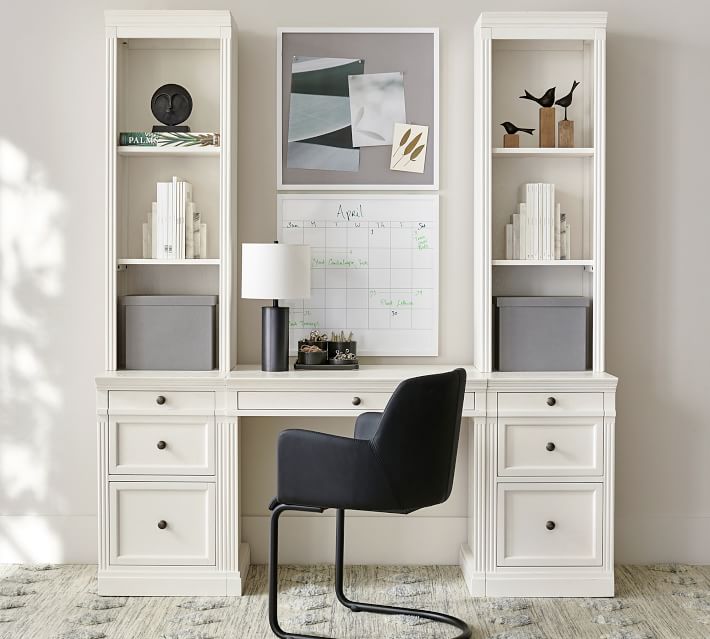

Price: $500-$9,000
Materials: Wood (they carry both solid and engineered, so be sure to check)
Type: Computer & writing desks, desk/bookcase combos, corner desk, standing desk
Eco Features: “Certified Non-Toxic,” Sustainably-Sourced, Fair Trade
Our Pick: Livingston Desk with Bookcase Towers
Pottery Barn has a collection of “Certified Non-Toxic” furniture, which essentially means they carry either an OEKO-TEX and/or GREENGUARD certification. Many of their desks use sustainably sourced and Fair Trade materials as well. Like West Elm, Pottery Barn also uses both solid wood and engineered wood, so just make sure you read the description before buying.
If you’d prefer glass, Pottery Barn also carries a nice writing/computer desk made of glass, iron, and leather.
Medley (Best for a Minimalist Computer Desk)


Price: $2,595-$2,995
Materials: Solid wood
Type: Minimalist writing/computer desk
Eco Features: Handmade in Los Angeles; all-natural finish; eco-friendly solid wood; made without harsh chemicals or fire retardants
Our Pick: Hank Desk
We love this gorgeous Hank Desk—it’s hand-carved with smooth, curved edges and a mid-century look. You can choose between solid walnut (dark-colored wood) and solid maple (light-colored wood), both of which are sourced domestically in the U.S.
Medley’s desks are finished with non-toxic and all-natural finishes without any harsh chemicals.
Use the code THEFILTERY5 for 5% off your order.
wwmake (Best Eco-Friendly Reclaimed Wood Desks)
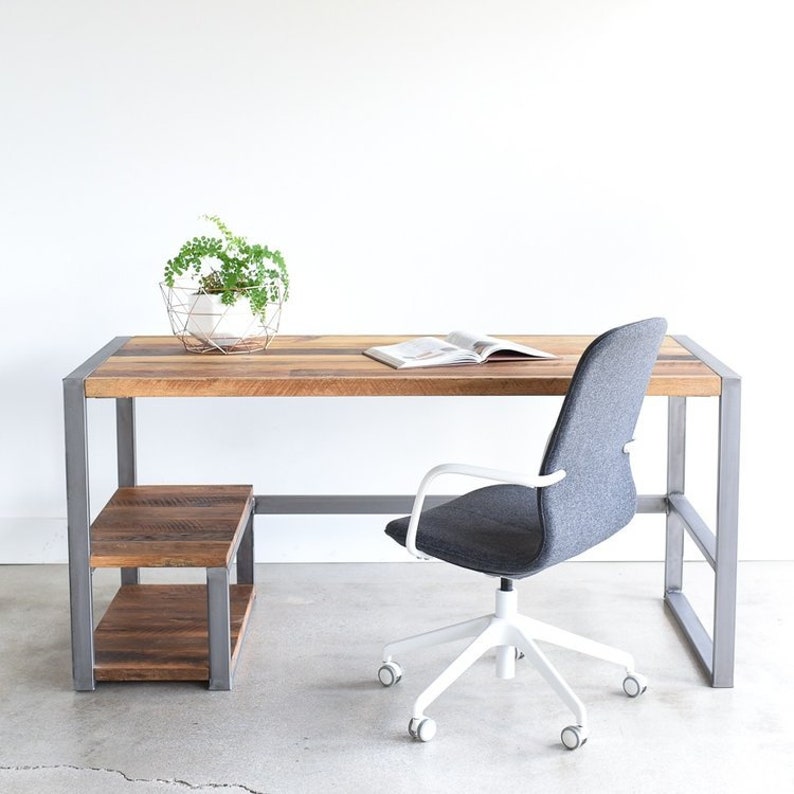

Price: $1,095-$2,295
Materials: Reclaimed hardwood, steel
Type: Standard writing/computer desks
Eco Features: Handmade in Chicago; reclaimed/recycled wood; eco-friendly finishes
Our Pick: Rustic Reclaimed Wood Desk with Two Shelves
Everything from this small company is handmade in-house in Chicago, Illinois. They use (beautiful!) solid reclaimed/recycled wood from old-growth trees, so every desk is really something unique and special.
They finish each desk with eco-friendly, low-VOC finishes that are still durable enough that your desk is meant to “last a lifetime.”
They have different styles of desks that come with and without drawers and shelves.
NotADesk (Best Floating Mobile Desk)


Price: $165
Materials: Bamboo (along with recycled plastic, steel, and iron for the holder)
Type: Compact mobile floating desk
Eco Features: FSC-certified bamboo and recycled plastics
If you’re a digital nomad, if you move around to different co-working spots all the time, or if you just don’t have very much space, you might want to check out a floating desk.
This super-compact desk has a heavy-duty suction cup on the back of it so you can easily mount it onto any window and get to work with a great view. Of course, you can mount it at any height, so it can be a sitting or standing desk.
NotADesk also offers a foldable chair + desk version so that you can literally take your desk anywhere (even without the window).
Home
The Best Non-Toxic Ergonomic Office Chairs (& Cushions!)
There is a lot to consider when choosing the best non-toxic office chair for you: materials, ergonomics, aesthetics, working habits, and more. We put together this guide to help!
A Few More *Pretty Good* Options for Non-Toxic Desks
Here are a few more brands we like, but be aware that they due use plywood.
Work From Home Desks (Best Modular/Collapsible Desk)
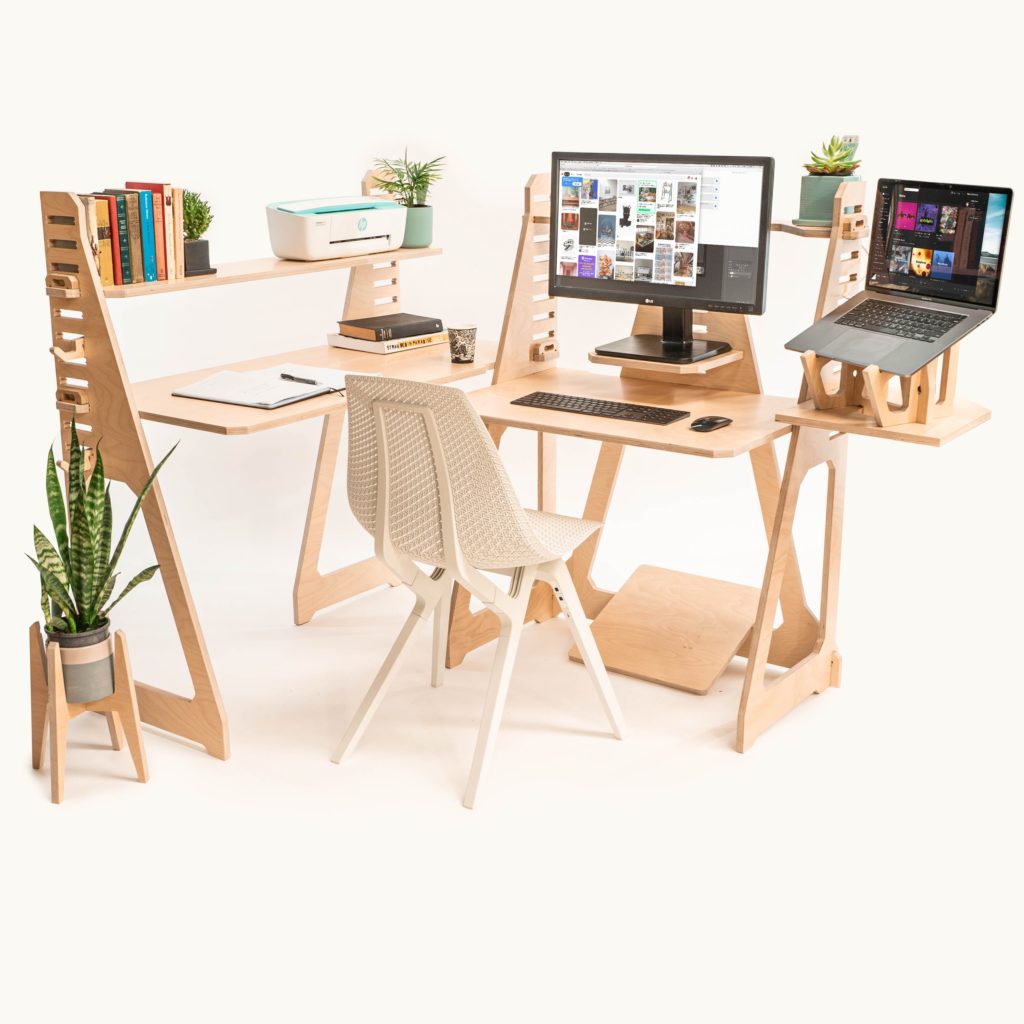
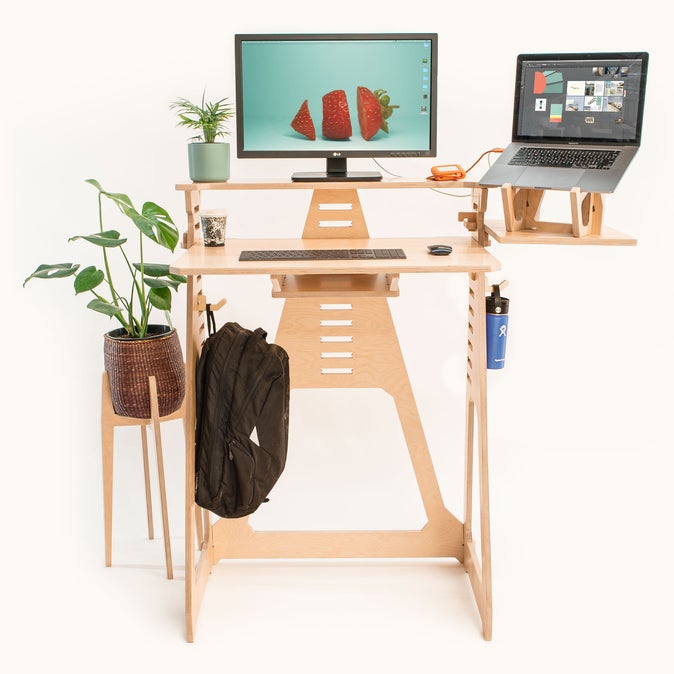
Price: $475-$1,295.00 (for a bundle)
Materials: Baltic birch plywood
Type: Standing desk, sitting desk, kids’ desk
Eco Features: FSC certified birchwood (ply), EPA certified for low emissions (low formaldehyde)
This is a really cool modular brand that allows you to basically build your own desk based on what kind of shelving you need, what size, etc. Check out their bundle page to get inspired by all of the different shapes and sizes you can create. PLUS, these are really easy to fold up and store under your bed or in the closet.
Even though they do use plywood, it’s certified according to various different standards to be low formaldehyde, so it’s still a better option than many other conventional desks.
Steve’s Rack Shack

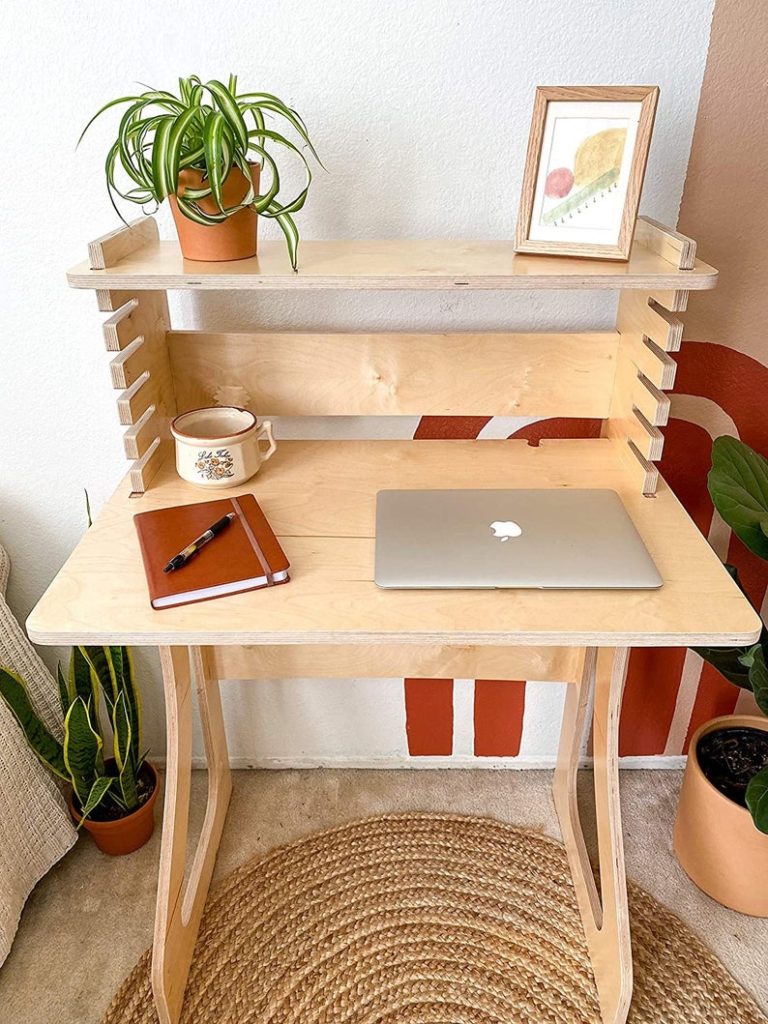
Price: $212-$297
Materials: Baltic birch plywood
Type: Adjustable sit/stand desk
Eco Features: Handmade in the U.S.
This handmade wooden desk can be switched from a sitting desk to a standing one and back again—all you have to do is pull the tabletop part of the desk out and move it up or down on the notches.
You can order this desk in different sizes to either fit a narrow space or fill up a larger one. Plus, it’s SUPER easy to assemble and then collapse and store when needed… You don’t need any tools at all!
Bonus: Fluidstance Balance Board for Your Standing Desk


Price: $119 (kids’ version) – $379
If you’re using a standup desk, you might want to check out these Fluidstance balance decks, which are made from bamboo, wood and aluminum. Here are some of the potential benefits you might experience from using the balance board:
- Exercise stabilizing muscles
- Soothed stiff joints
- More calories burned
- Increased focus & alertness
Conclusion
Most of us spend quite a bit of time at our desks each day. Choosing a non-toxic, natural, and low-VOC desk can help decrease our indoor air pollution and foster a healthy work environment!
Image Credits: All product photos belong to respective brands



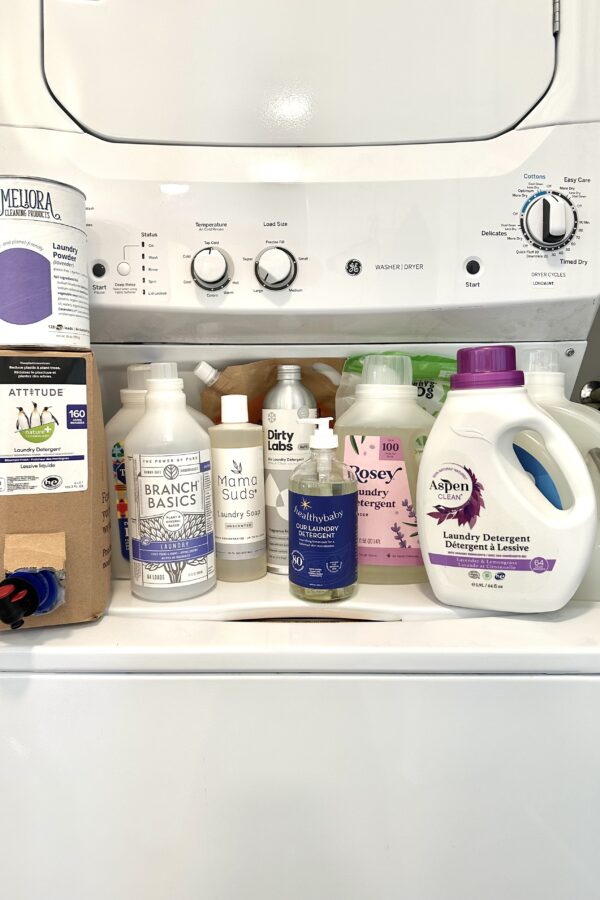


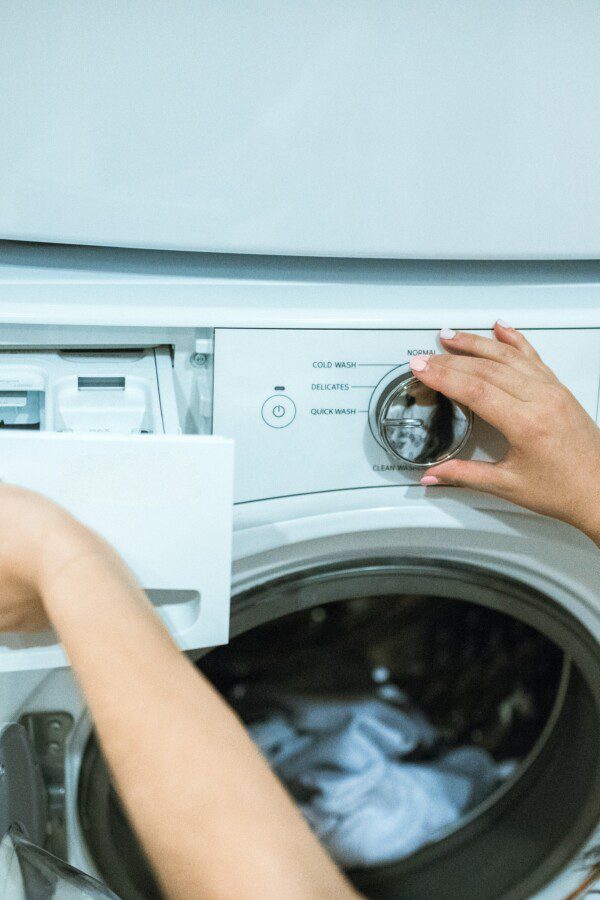
Hello there, thank you for all this helpful info. I was looking for the healthiest desk options for my kids for their bedrooms. I had decided to go all glass, just like the sample you posted on your page (sample at Walmart). I found one that looks exactly the same on amazon but all these “all glass” desk options have a prop 65 warning. I tried to get more info about why they have this warning, but no one can answer my question. Since it’s all glass, and glass isn’t supposed to be toxic, do you happen to know why this warning?? I don’t want to be mislead, pay hundreds of dollars and still have a toxic desk in my kids room. Please assist.
Hi Lisa,
Yea, unfortunately, it can be difficult to know what exactly the Prop65 label is indicating! For these “all-glass” desks, my guess would be that it has to do with the legs of the desk (as opposed to the glass part). For example, it could be that the paint used for the legs is not completely free of lead or something like that. However, I did a quick Amazon search for “all glass desk” on Amazon and I did find some that do not have a Prop65 label, so I think you should be able to find one that’s a good fit for you!